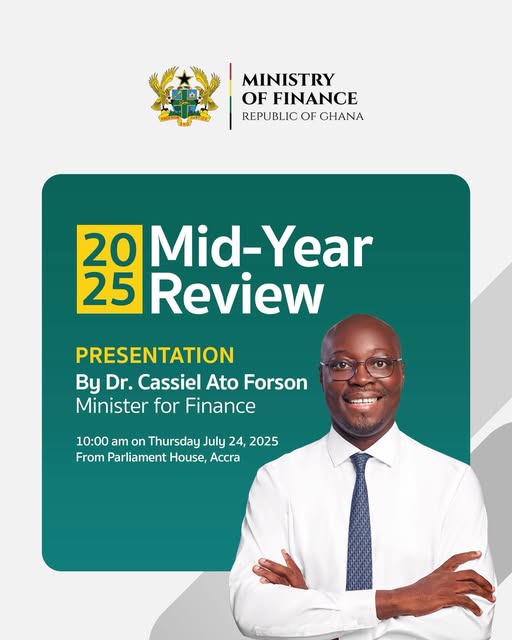All eyes are on Parliament, as Finance Minister, Dr. Cassiel Ato Forson, is set to deliver the highly anticipated 2025 Mid-Year Fiscal Policy Review to Parliament on July 24, 2025. This presentation marks a critical milestone, offering a comprehensive update on the nation’s economic health and the progress of policies promised earlier this year.
Earlier in the year, amidst spirited debates and rigorous scrutiny, Dr. Forson made bold pledges: stabilizing the volatile cedi, reducing stubborn inflation, and laying the groundwork for sustainable growth. Under the bright lights of parliamentary vetting, he assured lawmakers that these objectives were not just aspirational but achievable through targeted fiscal and monetary measures.
Now, six months into the year, the government’s efforts are coming into focus. The upcoming review promises to highlight what has been accomplished—and what remains to be done—as Ghana navigates a complex economic landscape shaped by both internal reforms and external shocks.
This report will detail how the government translated political commitments into actionable policies that to say the Bank of Ghana’s interventions aimed at stabilizing the cedi have included liquidity management and measures to curb speculative trading.
Inflation reduction strategies involved tightening monetary policy and adjusting fuel prices to curb rising costs.
Revenue mobilization efforts through tax reforms and improved compliance have begun to bolster state coffers.
While some indicators have shown improvement—such as a slight stabilization of the currency and a marginal decline in inflation—challenges persist, including rising debt levels and external economic pressures.
To contextualize the numbers, we gathered perspectives from diverse voices across Ghana, and some members of Parliament expressed cautious optimism. As they say there’s progress, but there is a need to see more tangible benefits for the people—more jobs, lower prices, and stability that lasts.
La, Amasaman, and Kantamanto traders shared mixed feelings, adding that prices of goods are stabilizing, but many remain wary of ongoing inflation and high fuel costs that continue to squeeze their margins.
As the nation prepares to hear the detailed review, the question lingers have the government’s assurances will translate into genuine relief for the average Ghanaian. Early indicators suggest some cautious progress, but many believe that more decisive and sustained efforts are needed to truly stabilize the economy and improve livelihoods.
While the policies have laid a foundation, the road ahead requires resilience, strategic focus, and inclusive growth initiatives to ensure that the benefits reach all sectors of society.
Tomorrow’s presentation is more than just a routine update; it’s a moment to assess the journey so far and chart the way forward. Ghana’s economic future hinges on the government’s ability to deliver on its promises and to translate policy into tangible improvements in the lives of its people.
As the nation waits, all eyes will be on the Minister’s delivery—hoping that the journey from promise to progress continues steadily, and that the pulse of Ghana’s economy beats stronger with each step forward.
Would you like me to include specific details, quotes, or focus on particular areas?






































